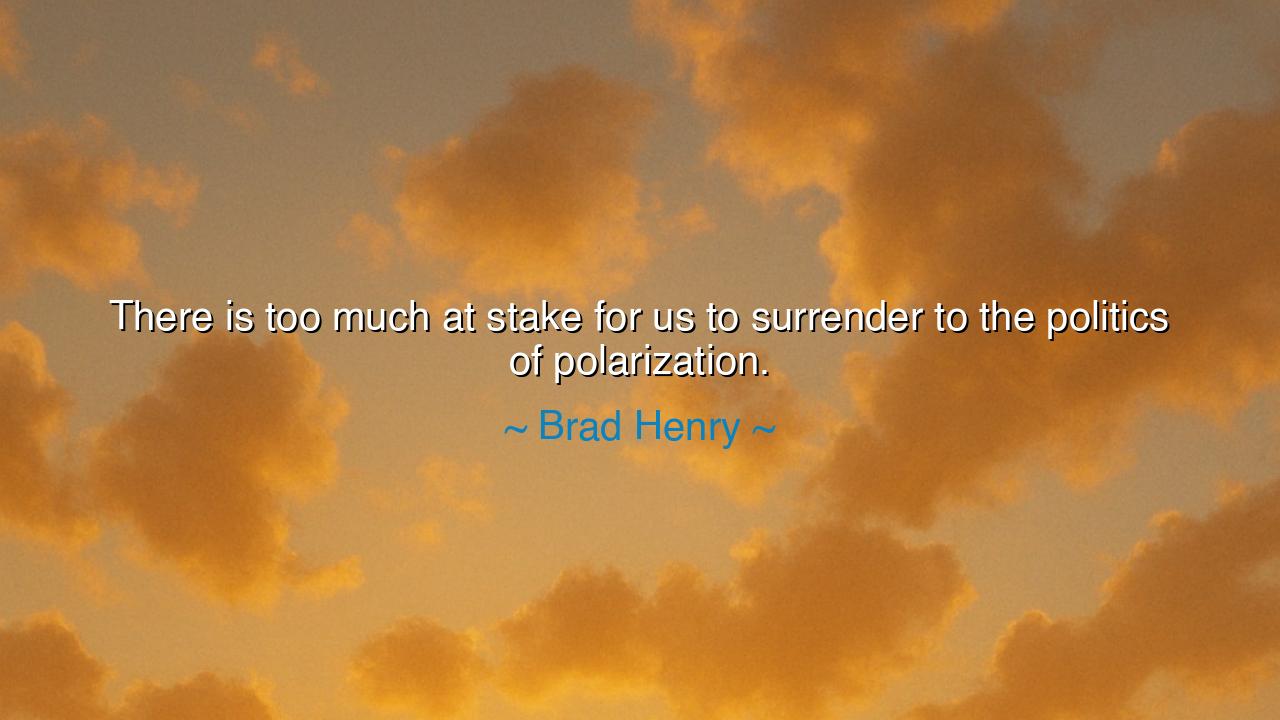
There is too much at stake for us to surrender to the politics






The words of Brad Henry resound like a trumpet-call in an age of division: “There is too much at stake for us to surrender to the politics of polarization.” In these words, he warns that a nation’s destiny cannot be secured if its people are set against one another, faction against faction, citizen against citizen. The politics of polarization is not mere disagreement, but a poison that rends the common fabric, making enemies of neighbors and leaving the house divided against itself.
History has seen such ruin before. In the final days of the Roman Republic, the voices of Cicero and other statesmen were drowned by the clash of factions—optimates and populares tearing each other apart until Julius Caesar crossed the Rubicon and the republic perished. Here lies the danger Henry warns against: when polarization reigns, the greater good is forgotten, and ambition feeds upon the carcass of unity.
But there are also moments when nations resisted division. In America during the dark days of the Civil Rights struggle, leaders like Martin Luther King Jr. called the people not to deepen their hatreds but to rise above them. He knew that too much was at stake—the very soul of the nation. If the politics of polarization had triumphed then, justice would have been delayed for generations longer. But through unity, sacrifice, and faith, progress was made, and the nation drew closer to its promise.
Henry’s words remind us that politics is not a game of victory for one side and defeat for another, but the shared labor of building a common future. To surrender to polarization is to choose destruction over creation, strife over stability, chaos over peace. Leaders who choose such a path gamble not only with their opponents but with the lives of the people they claim to serve.
O children of the future, learn this wisdom well: when the stakes are high, when the destiny of a nation trembles, division is the enemy, not the solution. Guard yourselves against the temptations of faction, for the strength of a people lies in their unity. The politics of polarization devours nations from within, but the politics of harmony builds civilizations that endure. Choose always the harder path of reconciliation, for it is the path of greatness.






TPtruc phan
I think Brad Henry makes an important point about the destructive effects of polarization. It’s easy to get swept up in the partisan divide, but the quote calls for a broader perspective. Is there a way to refocus on the issues that matter most, like economic stability and social progress, without allowing partisan politics to dominate? What steps can we take to overcome this challenge?
PANguyen phuong anh
This quote seems to imply that the future is at risk due to the growing divide in politics. While I understand the sentiment, I wonder if it is too idealistic to think that polarization can be easily overcome. What would it take for society to genuinely set aside political differences for the greater good, and are we ready for such a shift?
NHTuan Hiep Ng Hoang
The statement suggests an urgent need to move beyond partisan politics, which is something I agree with. But is it realistic to expect politicians to prioritize unity over their own interests and party agendas? How do we combat the growing trend of 'us vs. them' mentalities, especially when it seems like political polarization has become so ingrained?
HATuan Ho Anh
Brad Henry's quote resonates with the current political climate. It's concerning how polarization has become so entrenched in modern politics. Could this division hinder progress, especially when the stakes are high? How can we begin to bridge these divides, and is it even possible to unite a deeply fragmented society without addressing the root causes of polarization?